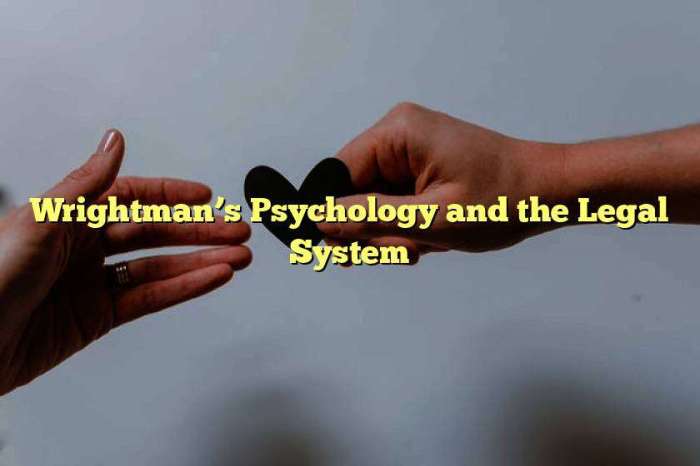Wrightmans psychology and the legal system – Wrightman’s psychology and the legal system have become inextricably intertwined, shaping the landscape of legal proceedings. This article delves into the profound influence of Wrightman’s theories, assessment tools, and insights on the field of forensic psychology.
Wrightman’s psychological framework has provided invaluable tools for understanding criminal behavior, conducting competency evaluations, and informing legal decision-making.
Introduction

Wrightman’s psychology has had a significant impact on the legal system, providing valuable insights into the psychological factors that influence criminal behavior and legal decision-making. His theories and assessment tools have been widely used in legal settings, shaping the field of forensic psychology and influencing criminal justice practices.
Wrightman’s psychological theories emphasize the role of cognitive and emotional factors in criminal behavior, challenging traditional notions of criminality as solely driven by biological or environmental factors. His work has contributed to a more nuanced understanding of the complex interplay between psychological processes and criminal activity.
Wrightman’s Psychological Assessment Tools
Wrightman developed a range of psychological assessment tools that are used in legal settings to evaluate competency, assess risk, and provide insights into criminal behavior. These tools include:
- Structured Interview of Reported Symptoms (SIRS):Assesses the validity of self-reported symptoms in criminal defendants.
- Violence Risk Appraisal Guide (VRAG):Predicts the likelihood of violent recidivism in offenders.
- Psychopathy Checklist-Revised (PCL-R):Assesses psychopathic traits in individuals.
Wrightman’s Theories on Criminal Behavior
Wrightman’s theories on criminal behavior focus on the psychological factors that contribute to antisocial and criminal behavior. He proposed that:
- Cognitive distortions:Criminals often exhibit cognitive distortions, such as rationalization, minimization, and blaming others, which justify their actions and reduce their sense of guilt.
- Emotional deficits:Criminals may have deficits in empathy, remorse, and guilt, which impair their ability to understand and respond to the emotional consequences of their actions.
- Impulsivity and sensation-seeking:Criminals tend to be more impulsive and sensation-seeking, which leads them to engage in risky and antisocial behaviors.
Wrightman’s Influence on Forensic Psychology
Wrightman’s work has significantly shaped the field of forensic psychology. His theories and assessment tools have become essential components of forensic evaluations, providing valuable insights into the psychological functioning of criminal defendants and offenders.
Wrightman’s emphasis on the role of cognitive and emotional factors in criminal behavior has challenged traditional approaches to criminal justice and rehabilitation, leading to a more holistic understanding of the causes and consequences of crime.
Ethical Considerations, Wrightmans psychology and the legal system
The use of Wrightman’s psychological tools and theories in the legal system raises ethical considerations. Concerns include:
- Bias and misinterpretation:Psychological assessments can be biased or misinterpreted, leading to inaccurate conclusions and unfair outcomes.
- Privacy and confidentiality:Psychological assessments can reveal sensitive information about individuals, raising concerns about privacy and confidentiality.
- Competency and training:It is crucial that professionals who administer and interpret psychological assessments are competent and adequately trained to ensure the accuracy and reliability of the results.
Question Bank: Wrightmans Psychology And The Legal System
What are the key principles of Wrightman’s psychological theories?
Wrightman’s theories emphasize the role of psychological factors in criminal behavior, including cognitive distortions, personality traits, and environmental influences.
How are Wrightman’s psychological assessment tools used in legal settings?
Wrightman’s tools, such as the Psychopathy Checklist-Revised, are widely used in competency evaluations, criminal profiling, and risk assessments.
What are the ethical considerations associated with using Wrightman’s theories and tools in the legal system?
Potential biases, misinterpretations, and the need for qualified professionals to administer and interpret the assessments must be carefully considered.

